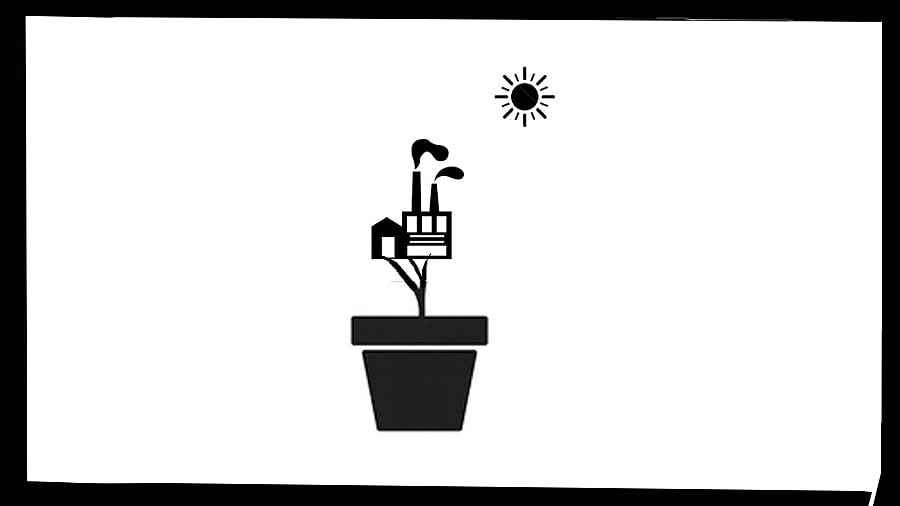
By S Ashwin Ram
This year has been dramatic for India in terms of extreme weather events. The country has been witnessing recurring episodes of these events and their trail of distressing aftermaths – from heatwaves to landslides, from water scarcity to flooding – across the regions. India is one of the countries that are highly susceptible and vulnerable to the impacts of climate change. There is growing evidence that climate change will have unprecedented effects on the economic development of countries; developing countries, particularly, are expected to face disproportionate impacts on key development outcomes. This makes it increasingly critical to understand the role of the state in identifying and prioritising environmental and sustainability challenges.
The Nobel Prize in Economics this year was awarded to Daron Acemoglu, Simon Johnson, and James Robinson for their contribution toward explaining the role of institutions in shaping the prosperity of nations. They argue that the differences in the economic development of nations can be understood by the nature of societal institutions in these countries. Their work particularly explains the effects of colonialism in the formation of present-day institutions and its influence on economic development. According to the Nobel Laureates, countries that have extractive institutions with exploitative laws, weak rules and regulations, corruption, and poor administrative capacity face the challenge of limited growth and development. Whereas countries with inclusive institutions governing the society are people-centric, democratic, transparent, and have efficient rules and regulations, which form the basis of inclusive development.
The Nobel recognition has, in an emphatic manner, just reiterated the importance of institutions, and the vital role they play in addressing growth and development challenges. Can these institutions also address the growing environmental concerns and improve the outcomes for sustainable development? The answer is a resounding yes. The state plays an important role in the provision of public goods, and most of the environmental problems that we face such as air pollution, water crisis, and loss of biodiversity are also pointers to a systemic failure. Therefore, the state has a huge responsibility, and the power, to form institutions that can address environmental challenges and promote sustainable development. How can institutions be equipped to take up concerted programmes toward the realisation of these goals?
Economics does offer evidence and solutions to some of these pressing issues. Well-defined common property rights, targeted nudges, right incentives, and a decentralised and polycentric model of governance are essential to managing collective goods. Elinor Ostrom – the first woman to win a Nobel in Economics for her analysis of economic governance, “especially the commons” – was a pioneer in advocating for polycentrism in environmental governance, particularly in managing common open access resources such as freshwater which are often subjected to misuse and overexploitation. Polycentric governance is a type of governance mechanism that advocates for user associations, community participation, and collective action in managing natural resources.
Costs higher for developing nations
Globally, climate change and environmental issues are catching the attention of governments, policymakers, and the community at large. The economic cost of climate change and extreme weather events varies significantly across countries, and it is markedly higher for developing nations. For instance, the economic cost of climate change impacts on the Indian economy is roughly estimated at 5% of its GDP. Moreover, the impact of climate change and environmental degradation is disproportionate across different sectors and income groups. The poor are often left to bear a significant burden and damage, albeit contributing least to the problem.
Good governance and institutional framework are backed by the rule of law which is binding. Inclusive institutions not only support the convergence theory or the catch-up effect by narrowing the income gap between economies, but would also help in reducing the widening gap in wealth and income inequality, and subsequent exposure to environmental risks across different economic classes. This is where redistribution of income and correcting market failure in a fair and equitable manner assume significance as one of the primary objectives of governments.
India is one of the fastest emerging economies and aspires to become a developed country by 2047. The high economic aspiration is only feasible with strong support from both private and public institutions. However, there has been an increasing concern that in the process of improving economic growth and living standards of its 1.4 billion population, the country’s environment and natural resources are at risk of degradation and depletion. There is a significant trade-off in achieving economic growth and environmental sustainability simultaneously. It should also be emphasised that the stock of natural resources and the state of the environment are paramount in achieving inclusive and sustainable development.
The country has to strategically navigate through this complex challenge, and the state is expected to play a significant role in balancing this trade-off. India is one of the largest democratic countries with a strong constitution and a long history of decentralised governance. The government is also making efforts and a commitment to address climate change and environmental issues. However, these efforts need to be scaled up and strictly enforced.
India has various environmental regulations to protect and safeguard its critical ecosystems and natural resources but often, the challenges emerge at the stages of implementation and monitoring. There are huge data gaps in assessing the state of the environment, and we need to build robust data to form evidence-based environmental policies. The country also faces significant political and governance challenges in addressing environmental issues. At the end of the day, we should also realise that for a country to grow and prosper, its economic standing should drive its politics and not vice versa.
(The writer is an Assistant Professor of Economics at RV University, Bengaluru)